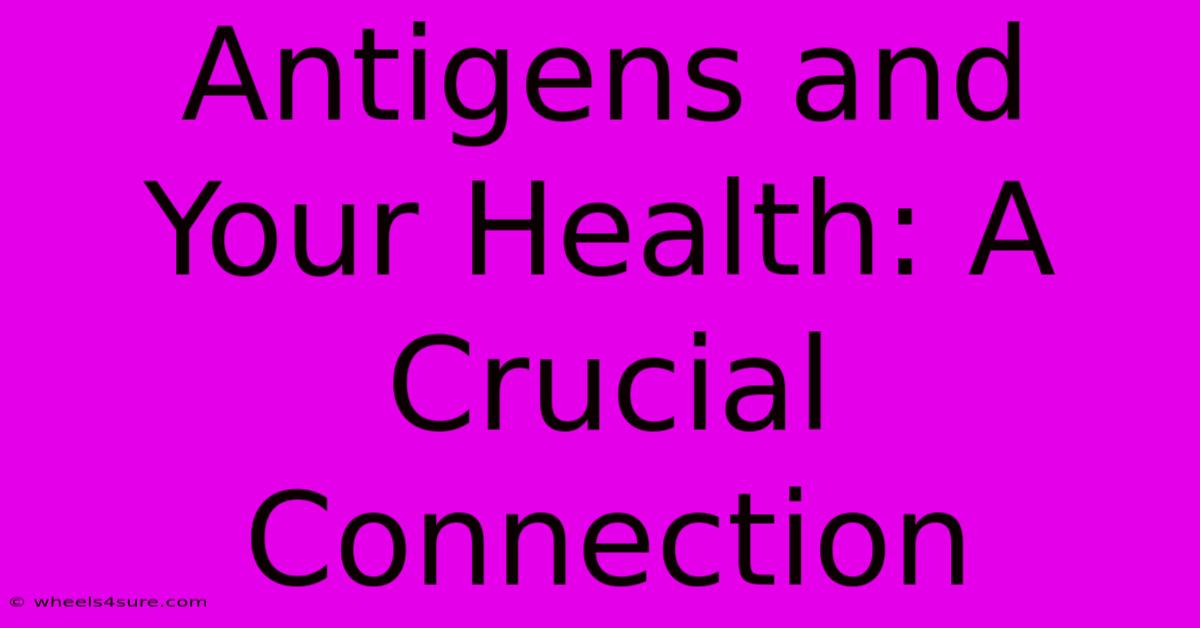Antigens And Your Health: A Crucial Connection

Table of Contents
Antigens and Your Health: A Crucial Connection
Understanding antigens is key to understanding your health. They're not just abstract medical terms; they play a vital role in your body's defense mechanisms and are central to many health issues. This article explores what antigens are, how they impact your well-being, and their connection to various diseases and treatments.
What are Antigens?
Simply put, antigens are substances that trigger an immune response. These substances can be anything from:
- Bacteria: Harmful microorganisms that cause infections.
- Viruses: Even smaller than bacteria, viruses invade cells and can lead to various illnesses.
- Fungi: A type of microorganism that can cause infections, particularly in individuals with weakened immune systems.
- Parasites: Organisms that live on or in a host and benefit at the host's expense.
- Pollen: A common allergen that can trigger allergic reactions in sensitive individuals.
- Food proteins: Certain proteins found in foods can act as antigens, leading to food allergies.
- Drugs: Some medications can trigger an immune response, leading to adverse reactions.
- Toxins: Harmful substances produced by bacteria or other organisms.
- Cancer cells: The body's immune system recognizes cancer cells as foreign and mounts an immune response.
Essentially, anything your immune system recognizes as "foreign" can act as an antigen. The body's response to these foreign invaders is crucial for maintaining health.
How Your Body Responds to Antigens
When an antigen enters your body, your immune system springs into action. This response involves several key players:
- White blood cells: These cells are the frontline defenders, recognizing and attacking antigens.
- Antibodies: Specialized proteins produced by the immune system that bind to specific antigens, neutralizing them or marking them for destruction.
- Lymphocytes: A type of white blood cell that plays a crucial role in adaptive immunity, providing long-term protection against specific antigens. These include B cells (which produce antibodies) and T cells (which directly attack infected cells).
This immune response can manifest in various ways, from a simple fever to a full-blown allergic reaction, depending on the type and amount of antigen present, as well as the individual's immune system strength.
Antigens and Disease
The interaction between antigens and your body is directly linked to many diseases and health conditions. For instance:
1. Infectious Diseases:
Many infectious diseases are caused by pathogens (bacteria, viruses, fungi, parasites) acting as antigens. Your body's immune response aims to eliminate these pathogens, leading to symptoms like fever, inflammation, and other immune-mediated reactions. The severity of the illness depends on the pathogen's virulence and the effectiveness of your immune response.
2. Allergies:
Allergies occur when the immune system overreacts to harmless antigens, such as pollen, food proteins, or pet dander. This overreaction can cause a range of symptoms, from mild itching and sneezing to severe anaphylaxis (a life-threatening allergic reaction).
3. Autoimmune Diseases:
In autoimmune diseases, the immune system mistakenly attacks the body's own cells and tissues. This happens because the immune system fails to distinguish between "self" and "non-self" antigens. Examples include rheumatoid arthritis, lupus, and type 1 diabetes.
4. Cancer:
Cancer cells often express antigens that are different from normal cells. The immune system can sometimes recognize and destroy these cancer cells, playing a crucial role in cancer surveillance and preventing tumor growth. Immunotherapy treatments aim to harness the power of the immune system to fight cancer by targeting these cancer-specific antigens.
The Importance of a Healthy Immune System
Maintaining a strong and healthy immune system is crucial in effectively combating antigens and preventing or minimizing the impact of various diseases. A healthy lifestyle, including a balanced diet, regular exercise, adequate sleep, and stress management, can significantly contribute to immune system health.
Conclusion: Understanding the Antigen-Immune System Connection
Antigens are a fundamental aspect of health and disease. Understanding their role in triggering immune responses is crucial for comprehending the mechanisms behind infectious diseases, allergies, autoimmune disorders, and even cancer. By supporting a healthy immune system, we can better equip our bodies to combat these antigens and maintain overall well-being. Remember to consult with healthcare professionals for any health concerns and to learn more about specific antigen-related conditions.

Thank you for visiting our website wich cover about Antigens And Your Health: A Crucial Connection. We hope the information provided has been useful to you. Feel free to contact us if you have any questions or need further assistance. See you next time and dont miss to bookmark.
Featured Posts
-
Hailie Jade Her Relationship With Her Father
Apr 07, 2025
-
Rohit Sharmas Age A Comparative Analysis
Apr 07, 2025
-
Discover Kalpana Raghavendars Daughters Secret
Apr 07, 2025
-
Jay Shah From Humble Beginnings To Immense Wealth
Apr 07, 2025
-
The Ultimate Guide To Understanding Conor Mc Gregors Wealth
Apr 07, 2025
